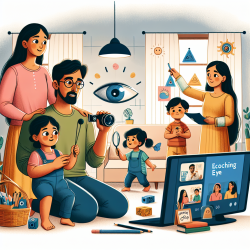As a practitioner focused on creating great outcomes for children, it's crucial to stay updated with the latest research and techniques. One fascinating study, "Using eCoaching to Support Mothers’ Pretend Play Interactions at Home," provides insightful data on how eCoaching can enhance pretend play interactions between mothers and their preschool children. This blog will break down the key findings and offer actionable steps for you to implement these insights into your practice.
Understanding eCoaching
eCoaching involves remote-based support where a coach provides guidance and feedback to caregivers via technology. This study explored how eCoaching can improve mothers' understanding and facilitation of pretend play with their preschool children. The results were promising, showing benefits for both mothers and children.
Key Findings
- Increased Knowledge: Mothers showed a greater understanding of the developmental benefits of pretend play, including vocabulary development, social skills, and creativity.
- Improved Facilitation: Mothers became more adept at recognizing and responding to their child's play needs, leading to more meaningful interactions.
- Enhanced Child Outcomes: Children demonstrated increased pretend play behaviors, such as object substitution and assigning absent attributes, indicating richer and more complex play.
Implementing eCoaching in Your Practice
Here are some steps to incorporate eCoaching techniques into your work with families:
- Set Clear Goals: Work with caregivers to set specific, achievable goals for their child's pretend play activities.
- Provide Structured Feedback: Use video observations to give caregivers detailed feedback on their interactions with their child.
- Encourage Reflection: Have caregivers reflect on their play sessions to identify what worked well and what could be improved.
- Foster a Collaborative Relationship: Build a trusting relationship with caregivers to make them feel supported and valued.
Encouraging Further Research
While this study provides valuable insights, there's always more to learn. Encourage caregivers to document their experiences and share them with you. This ongoing feedback can help refine your approach and contribute to the broader field of early childhood education.
To read the original research paper, please follow this link: Using eCoaching to Support Mothers’ Pretend Play Interactions at Home.










